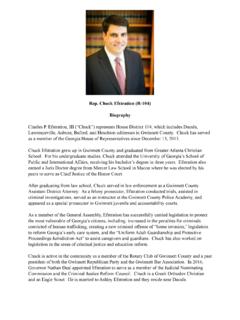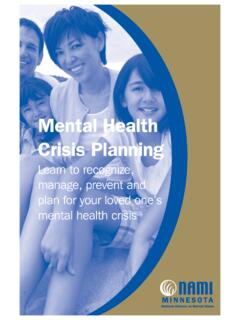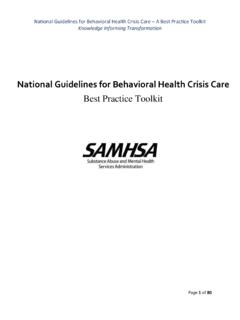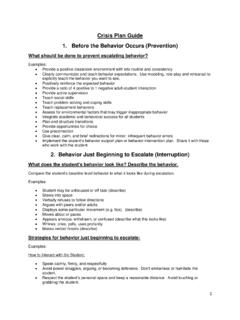Transcription of Involuntary Commitment and Behavioral Health Crisis ...
1 Georgia Department of Behavioral Health & Developmental DisabilitiesInvoluntary Commitment and Behavioral Health Crisis Services OverviewJudy Fitzgerald, CommissionerFebruary 7, 2020 Georgia Department of Behavioral Health & Developmental DisabilitiesInvoluntary Civil Commitment Adult Mental Health OverviewDr. Emile Risby, Director, Georgia Regional Hospital, AtlantaDBHDD HospitalsPsychiatric Treatment Full array of therapeutic modalities Nursing Care Psychosocial Rehabilitation Occupational Therapy Physical Therapy Speech Therapy Activity Therapy Music Therapy Medical Treatment Primary Care Provider Coordination of medical specialty care (surgical, endocrine, infectious disease, ophthalmology, GYN, etc.) Respiratory Therapy Wound Care Pharmacy Services Laboratory Services Dental Services Offered in DBHDD HospitalsDBHDD Hospital Bed CapacityAdult Mental Health (313 beds)Forensic (641 beds)Intellectual and Developmental Disabilities (ICF/SNF) (145 beds)57%15%28%Total Bed Capacity: 1,09913%58%29%As of December 12, 2019 DBHDD Inpatient Bed Capacity HospitalAdult Mental HealthForensicI/DD Nursing HomeTOTALGRHA -Atlanta11412423261 WCGRH -Columbus40154194 CSH -Milledgeville182182 ECRH -Augusta90719725283 GRHS -Savannah69110179 Total31364197481,099 Adult Mental Health (AMH) Services FY 2019 HospitalDischargesMedian Length of StayGRH-Atlanta81121 West Central55*112*East Central66414 GRH-Savannah65510*West Central primarily serves people with chronic inpatient needs.
2 30-Day Readmit Rate (AMH, not Court Controlled)GRHA AMH Program and Legal Statuses The Adult Mental Health Program at GRHA includes 3 inpatient units totaling 114 beds. Each unit serves adults, 18 and over, who have a variety of psychiatric diagnoses. Individuals may be experiencing psychiatric Crisis due to new or recurring mental illness, non-compliance with medications, use of intoxicants, psychosocial stressors, or a combination of these factors. The mission of the AMH Program is to stabilize and improve the functioning of persons with severe mental illness and Behavioral Health challenges. While at GRHA, individuals work closely with the hospital s Recovery Planning Teams and outside providers alike to develop clinically-appropriate discharge plans, ensure continuity of care, and achieve an independent level of functioning when integrated into the Program Staff Expertise AMH units operate under the administrative leadership of expert clinical staff including: physicians; registered and licensed practical nurses; social workers; Psychologists; and direct care team members Staff facilitate therapeutic activities in Psychosocial Rehabilitation Treatment Malls and Recreational Centers as well as enriching on-and off-campus opportunities.
3 Individuals are offered tailored services for limited English proficiency and/or sensory impairment. The individual has mental illness consisting of a disorder of thought or mood which significantly impairs judgment, behavior, capacity to recognize reality, or ability to cope with the ordinary demands of life. (Traumatic brain injury does not qualify as a mental illness.);AND Hospitalization is the least-restrictive level of care available for the individual; AND The individual presents a substantial risk of harm to himself/herself or others, as manifested by recent overt acts or expressed threats of violence, which present a probability of physical injury to himself/herself or others; OR The individual is so unable to care for his/her own physical Health and safety as to create an imminently life-endangering Involuntary Hospitalization CriteriaLegal Status FormsSee HandoutOnce an individual arrives to a State Hospital a: 1013 expires 48 hours (2 days).
4 1014 expires 5 business days from the date signed by the initiating or admitting physician, excluding holidays / weekends. 1009/1012 expires 180 days after being signed by the initiating or admitting physician. 1021 expires on the date specified by the probate court in the order. Forensic Court Order expires 365 days after the individual arrives to Status Guidelines and ExpirationEmergency Admission Flow ChartProbate Court OrderIssue based on:1) Unexpired 10132) Affidavit (2 persons who saw individual s behavior within past 48 hrs.)* Good for 7 days to apprehendEMERGENCY RECEIVING FACILITY1013 Good for 48 be examined by CARE DECISION TREEA pplicable to Georgia s Emergency Receiving, Evaluating and Treatment FacilitiesDischargeSign Voluntary1014 toEVALUATION FACILITY5 days excluding weekends & holidays.
5 ITP developedPeace OfficerTake to or any person who:1) Is committing penal offense AND2) There is probable cause to suspect individual is mentally ill and needs Involuntary treatmentOnly for remainder of time remaining on original commitment1021 CMO & 2 (examined within past 5 days)Filed within 5 days from admission to Eval FacilityHEARINGNo sooner than 7 days & no later than 12 daysAfter receipt of petitionTransfer to another Eval. Fac. at request & expense of individualSign VoluntaryDischargeDischargeOutpatient ITPInpt. Followed by Outpt. ITPI npatient IPTTREATMENT FACILITYUp to 6 monthsNOTE: If transfer from CSU to treatment facility is required for a hearing for Involuntary care, this must occur by the third day of the 5 day evaluation period*Georgia Law permits 1013 / 2013 to be signed byMD, Psychologist, LCSW, APRN [CNS].
6 1013 Good for 48 hrs. to evaluate *Good for 7 days toapprehendGeorgia Department of Behavioral Health & Developmental DisabilitiesForensic Civil CommitmentKaren Bailey, Director Office of Forensic ServicesForensic Commitment : Why is it Important to Understand 67% of state hospital mental Health beds Occupies a significant portion of our state hospital beds Demand exceeds capacity Increasing annually Forensic CommitmentsONLY in response to a legal questionNot mechanism for an individual in jail to obtain treatment Focus of treatment different Access/urgency different The Legal Questions Present status Ability to participate in trial in a fair and meaningful wayCompetency to Stand Trial Mental state at the time of the alleged offense Impacts whether person can be held legally responsible for their actions Insanity/Criminal ResponsibilityCOMPETENCY AND INSANITY The attorneys (generally, defense) The judgeQuestions can only be asked by.
7 Only occurs by court order from the judge in the criminal case Hospital Admission (or any forensic Commitment )NGRI (Not Guilty Be Reason of Insanity)30-day Evaluation PeriodCivil Commitment Annually, hospital reports opinion regarding Commitment criteria No limit on renewals Conditional Release Continue under jurisdiction of the Court and oversight of DBHDD Detailed plan based on a comprehensive risk assessment Monitored by DBHDD Similar to a blend of outpatient Commitment and probation, but not quite Automatic return to the hospital if DBHDD opines that it is needed Relatively steady populationIncompetent to Stand Trial (IST) Incompetent to ProceedJudge can commit for restoration Inpatient or Outpatient Statute non-violent offense Case Law ( 2018: Carr & McGourik) bond cases Initial Restoration Period: Up to 90 days report to Court Can be extended for an additional 9 months Note: option for change of type of Commitment If not Restored -Considered UnrestorableNolleProsequiand request DBHDD to petition in Probate Court Criminal Court retain jurisdiction & Oversee Civil Commitment Proceedings Inpatient or outpatient Up to one year Review annually Misdemeanors: up to one year Non-Violent Felony: up to 5 years or maximum sentence Violent Felonies: up to maximum sentence Criteria Same as non-forensic civil Commitment (Jackson v.)
8 Indiana) Reality: thresholds Lower for Commitment Higher for release What is Outpatient Commitment for IST? Looks like a Conditional Release, but isn t reallyDBHDD provides mental Health monitoring and reports to the criminal court annuallyIf return to hospital is needed, use probate procedures Notify Criminal Court Outpatient Commitment (Forensic)Monitored by Forensic Community Coordinator (FCC) Focus: Mental Health ComplianceOther Conditions of Release Plan Not Probation Officers Substance Use Role of CSBs/Outpatient Mental Health ProvidersIssues from DBHDD Perspective Results in those really needing services waiting Not all individuals need to be in the hospital for restoration Number of individuals ordered for hospital restoration exceeds capacity Barriers: Community Resources (housing)60% of Forensic Beds are Long-Term Civilly Committed ClientsMisdemeanor Use of the Forensic System What do we want it to do?
9 Are we casting forensic net to accomplish mental Health needs?Outpatient CommitmentGeorgia Department of Behavioral Health & Developmental DisabilitiesBehavioral Health Services: Crisis OverviewMonica Johnson, MA, LPCD irector Division of Behavioral HealthDebbie Atkins, MAC, LPCD irector, Office of Crisis CoordinationDivision of Behavioral Health OrganizationJill MaysOffice of Behavioral Health Prevention and Federal GrantsDant McKay Office of Children, Young Adults and FamiliesDebbie AtkinsOffice of Crisis CoordinationCassandra Price Office ofAddictive DiseasesAdrian Johnson Deputy DirectorTony SanchezOffice of Recovery TransformationTerri Timberlake Office of Adult Mental HealthKelly SterlingOffice of Deaf ServicesMonica JohnsonDirector, Division of Behavioral HealthMaxwell RuppersburgOffice of Supportive HousingCedric Bryant Business Operations ManagerAdil Rawji Project ManagerHetalPatel.
10 1 Field OfficeDawn PeelRegion 2 Field OfficeGwen CraddiethRegion 3 Field OfficeJennifer DunnRegion 4 Field OfficeJos LopezRegion 5 Field OfficeAnn RileyRegion 6 Field OfficeBehavioral Health Crisis ContinuumCrisis ResponseGeorgia Crisis & Access Line (GCAL)Mobile Crisis Response DispatchGCAL Text to Chat LineCrisis Bed Management SystemBehavioral Health Crisis Center (BHCC) Crisis Services Center (BH Urgent Care Walk-in Clinic)Temporary ObservationCrisis Stabilization BedsCrisis Stabilization UnitCrisis Stabilization BedsState-Funded Detox FacilityDetox Inpatient BedsPrivate psychiatric HospitalsContracted BedsState HospitalPsychiatric Inpatient UnitCrisis Bed Referrals are made via: GCAL 800 toll-free line BHL Web Electronic referral system (Live Board) Direct Admissions by BHCC/CSUR eferrals Originate from.

















